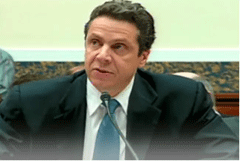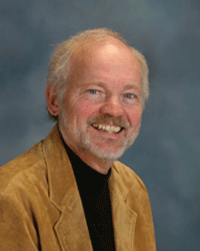The Bottom Line on Climate Change
Air Date: Week of September 21, 2007

The Attorney General of New York Andrew Cuomo. (Courtesy of the Attorney General's Office)
New York’s Attorney General has subpoenaed five energy companies, charging they did not disclose the financial risks of climate change to their shareholders. Host Steve Curwood talks with Vermont Law School professor Pat Parenteau about the move.
Transcript
CURWOOD: The Attorney General of New York, Andrew Cuomo, has subpoenaed five energy companies; AES Corporation, Dominion Resources Inc, Xcel Energy, Dyenergy Inc, and Peabody Energy. Mr. Cuomo suggests that their intent to build new coal-fired power plants could pose undisclosed financial risk to shareholders in light of global climate change. With us to put it into perspective is Patrick Parenteau, professor of law at Vermont Law School. Professor Parenteau, what does New York state’s securities law have to do with climate change?
PARENTEAU: First of all, the New York securities law is called the Martin Act. It’s a 1921 statute and it’s an act that former Attorney General, and now governor, Eliot Spitzer used very aggressively with Wall Street in the whole Enron scandal era to press corporations to reveal a variety of liabilities and risks associated with the way they were doing business—all in the nature of protecting investors. And of course with New York State one of the largest investors in the stock market is the State Employees Union, the pension plan, which is billions of dollars. So the Martin Act has been on the books for a very long time. A variety of Attorneys General have used it and now Andrew Cuomo is bringing it to bear on all this risk associated with climate change.

Dr. Patrick Parenteau, professor of law at Vermont Law School (Courtesy of Ed Chapin)
PARENTEAU: Well, here’s how it could work. Suppose the Congress enacts McCain-Lieberman, which will establish a national—what’s called a cap and trade program. And further suppose that Congress does not grandfather any coal plants. Now what happens is the companies that are operating existing plants and building new coal plants, let’s say, they typically rely on being able to pass on to the rate payers the costs of building these facilities and operating these facilities. But there’s a doctrine called the Prudence Doctrine, which says if the additional costs that are imposed could have been anticipated by the utilities they cannot pass those costs on to consumers. In other words the shareholders will absorb those costs. That’s the concern.
CURWOOD: How far might this investigation go back in history? For example Peabody Coal Company was a private company up until sometime in 2001. They had an initial public offering of stock on the scale of about a half a billion dollars. An initial public sale of stock by the way that came shortly after the White House Energy Task Force announced that there would be a big press for coal. To what extent my Peabody Coal face sanctions from Attorney General Cuomo if in that offering they hadn’t talked about the threat of climate change?

The Attorney General of New York Andrew Cuomo. (Courtesy of New York State Attorney General)
CURWOOD: A spokesperson for Peabody Coal has said that the Cuomo subpoenas are outrageous and said that the legal system was designed to protect, not harass, those such as Peabody, who are providing clean energy solutions for America. In his view, Attorney General Cuomo is on a witch-hunt. Your response?
PARENTEAU: That sounds like somebody who has something to hide, frankly. It would be far more prudent for Peabody spokespersons to say, ‘our books are open.’ When you hear terms like ‘this is a witch hunt’ and ‘he’s on a crusade’ or whatever, it suggests to me that maybe Cuomo’s onto something here.
CURWOOD: So we’re at the beginning of something here, we’re in the middle of something, we’re getting towards the end of something.
PARENTEAU: We’re at the beginning of the beginning. Climate change is truly a transformative issue in every sense of the word. It’s going to transform law, institutions, economies, governmental relationships—everything. And what we’re seeing in this instance is the effect of climate change on financial markets, on investor confidence, on who bears the risks and all of these questions are brand new for us, at this scale anyway. We just simply haven’t faced anything like climate change. And it’s just going to permeate throughout our entire governmental institutions and the market as well.
CURWOOD: Patrick Parenteau is senior council of the Environmental and Natural Resources Law Clinic and a professor of law at Vermont Law School. Thank you so much, sir.
PARENTEAU: Thank you, Steve.
CURWOOD: In a related story, 22 institutional investors and activists, ranging from Environmental Defense to the Kentucky State Treasurer have filed a petition with the Federal Securities and Exchange Commission asking that publicly-traded companies be required to disclose their financial risks from climate change.
Links
Attorney General Andrew Cuomo’s Website
Living on Earth wants to hear from you!
Living on Earth
62 Calef Highway, Suite 212
Lee, NH 03861
Telephone: 617-287-4121
E-mail: comments@loe.org
Newsletter [Click here]
Donate to Living on Earth!
Living on Earth is an independent media program and relies entirely on contributions from listeners and institutions supporting public service. Please donate now to preserve an independent environmental voice.
NewsletterLiving on Earth offers a weekly delivery of the show's rundown to your mailbox. Sign up for our newsletter today!
 Sailors For The Sea: Be the change you want to sea.
Sailors For The Sea: Be the change you want to sea.
 The Grantham Foundation for the Protection of the Environment: Committed to protecting and improving the health of the global environment.
The Grantham Foundation for the Protection of the Environment: Committed to protecting and improving the health of the global environment.
 Contribute to Living on Earth and receive, as our gift to you, an archival print of one of Mark Seth Lender's extraordinary wildlife photographs. Follow the link to see Mark's current collection of photographs.
Contribute to Living on Earth and receive, as our gift to you, an archival print of one of Mark Seth Lender's extraordinary wildlife photographs. Follow the link to see Mark's current collection of photographs.
 Buy a signed copy of Mark Seth Lender's book Smeagull the Seagull & support Living on Earth
Buy a signed copy of Mark Seth Lender's book Smeagull the Seagull & support Living on Earth

